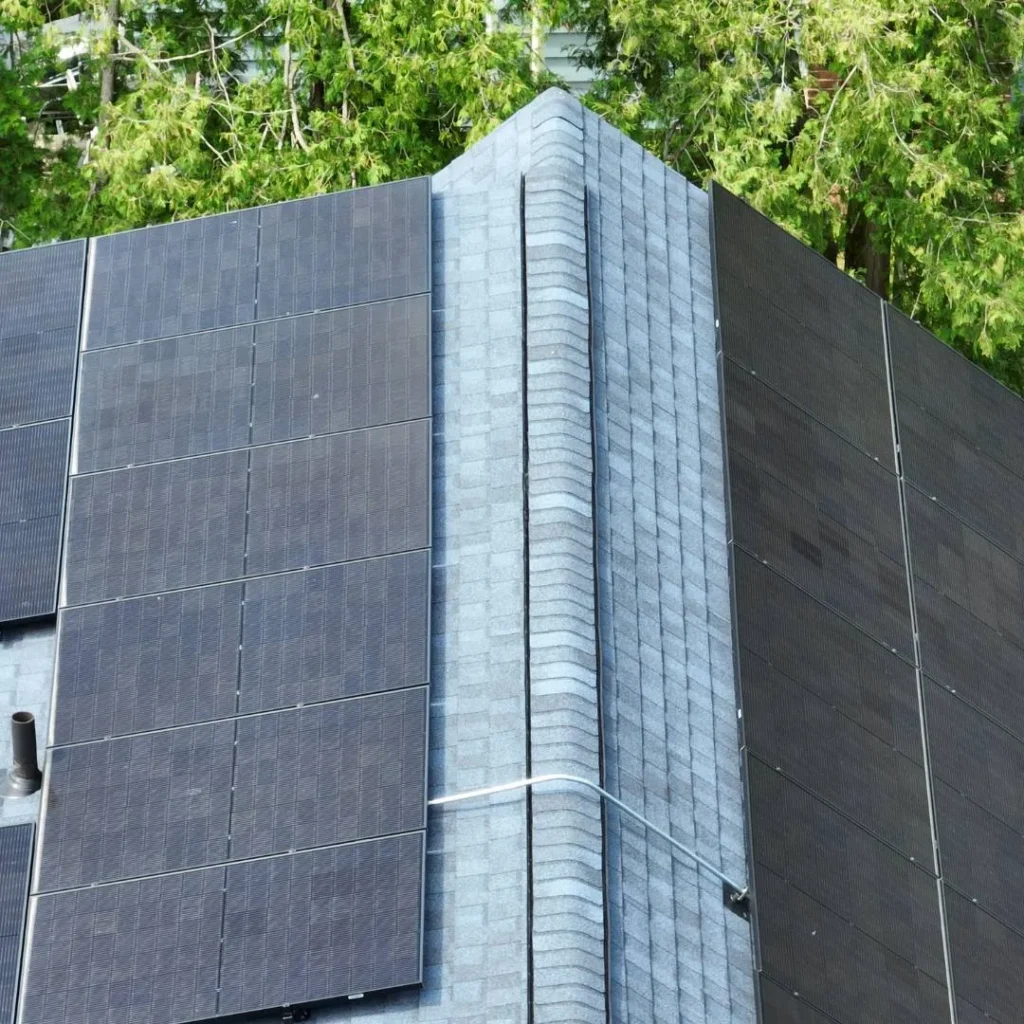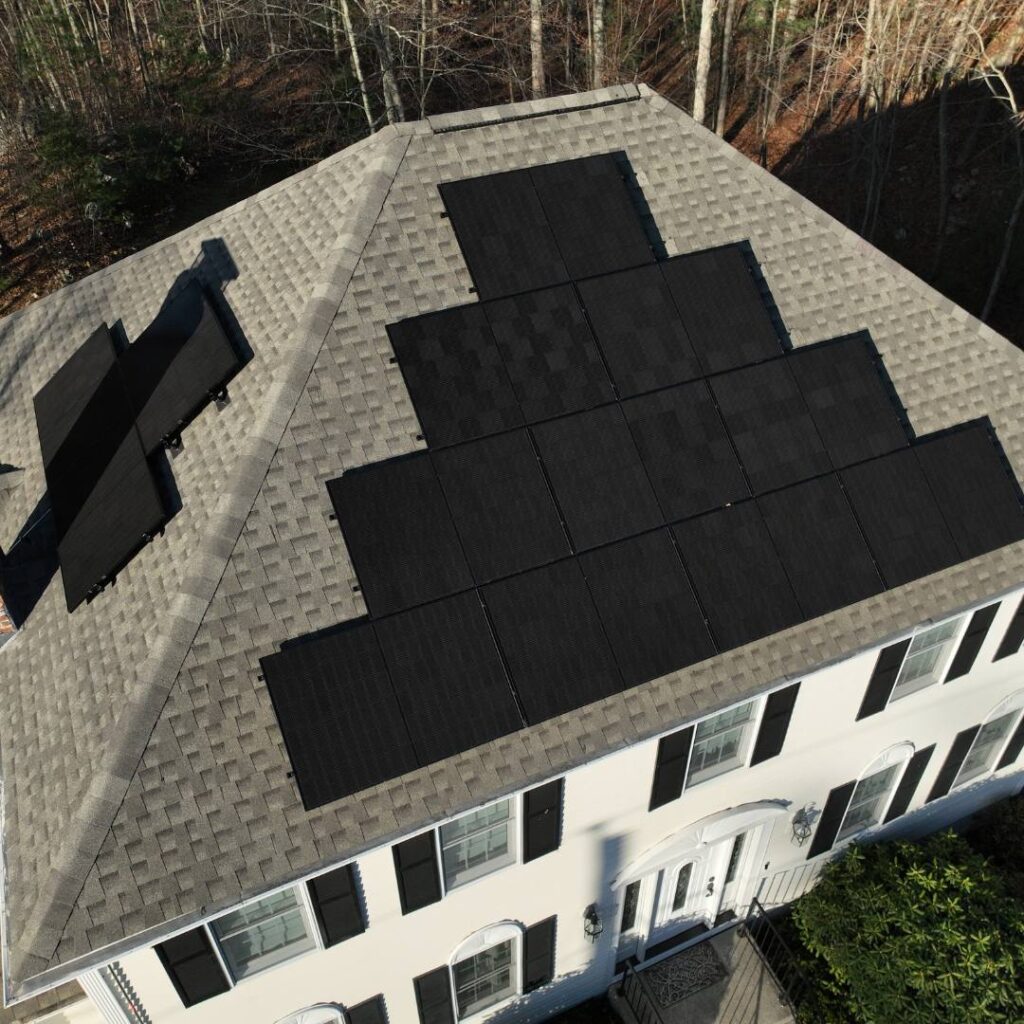How to Maximize Solar Panel Efficiency in Massachusetts Winters
How can you improve the efficiency of solar panels this winter? Our Massachusetts winters are full of cold temperatures, snowstorms, wind and reduced sunlight. These conditions can reduce the output and efficiency of your solar energy system. Fortunately, the following steps can help you get the most from your solar investment this winter.
3 important ways to maximize your solar energy investment
Just as you take special precautions for using your car in winter, take the steps needed for maximum solar power efficiency, including:
Do you notice any shingles that are missing? What about shingles that may be buckling, semi-attached, or flapping around? Are pieces of flashing pulling from the transition? Don’t worry about climbing up on the roof – we are happy to inspect that for you when we give you an estimate.
- Keep on top of maintenance: Winter maintenance ensures that panels are free of snow/ice, dirt, and debris.
- Schedule regular inspections: Inspections throughout the year, including winter, allow the installer to identify potential issues, resolve current ones, and adjust panels for maximum efficiency.
- Call on a reputable solar panel expert: Working on your roof can be dangerous any time of year, with increased danger if the roof is slippery or icy. A rooftop solar professional has the proper training, equipment, and knowledge for safely clearing panels, checking for any needed repairs, and adjusting the panels for maximum efficiency.

Tips for optimizing solar performance winter and year-round
Your solar system needs regular care. Not properly maintaining it can seriously reduce your power output and efficiency. Maximizing the efficiency of solar panels is a year-round job, with winter creating additional challenges. When choosing an installer, hire reputable experts you can trust to make the most of your home’s location and environmental factors.
Tips for maximizing solar panel efficiency in winter include:
Remove snow regularly
If the angle is right, snow may slide off naturally as the sun warms the surface. However, if snow accumulates, it must be removed carefully. Trying to clear the snow yourself during windy, icy conditions can easily cause a slip-and-fall disaster. The smart move is to call an experienced professional who has the right safety equipment, tools and training to remove snow without damaging the panels.
Adjust the tilt angle for winter conditions
Ensure that your installer positions and angles the panels to minimize snow buildup and improve winter energy production. A steeper tilt and angles of 40-60 degrees will help snow slide off and help panels absorb more sunlight. Your installer may recommend a mounting system that allows for manual or automatic tilt adjustments based on seasonal changes.
Invest in Higher-Efficiency Panels
Installing highly efficient solar panels is a big investment, but you can significantly boost energy output and efficiency. Solar panels designed for winter conditions may have built-in heating to melt snow. Installing self-regulating heat cables around the panels is another option.
If you think that high-efficiency panels might be right for your home, understand the impact of various features
Features to look for when investing in high-efficiency panels
- Low temperature coefficient: The temperature coefficient describes the percentage of power output a solar panel loses as the temperature rises. Panels with a coefficient closer to zero will handle cold weather better than panels with a higher coefficient. Most solar panels today have a temperature coefficient between -0.3% and -0.5% per degree Celsius.
- High efficiency: Solar panel efficiency, the rate at which sunlight converts to electricity, varies between 15% and 22% for typical home systems. As technology improves, higher efficiency levels are becoming the norm, with some up to 40%.
- Optimal snow load rating: This rating describes how much snow load a panel and frame can withstand. In Massachusetts, the snow load rating typically falls within 30-50 pounds per square foot (psf), depending on the specific location and building code requirements within the state's snow load zones.
- Monitoring Systems: Solar monitoring systems may be useful in tracking the amount of energy generated and ensuring the optimal function of your solar panel system.
How solar panel efficiency can be impacted by winter weather
The efficiency of solar panels can take a hit in winter weather. It’s important to optimize the performance of solar panels year-round, but winter weather presents special challenges:
- Snow: Snowfall is often the first concern in winter. A light dusting of snow has little impact on solar panels because the wind can easily blow it off and light can penetrate a sparse coating. However, heavier snow accumulation can stop energy production.
- Reduced Daylight: Shortened days and the lower angle of the sun reduce the intensity of the sunlight reaching your panels and lessen total energy production. When coupled with overcast skies, solar efficiency takes a double hit.
- Ice: Ice formation on the panels can reduce efficiency by creating a surface that makes it difficult for ice to slide off. Ice can also create uneven shading, further reducing efficiency.
- Cold: Contraction from the cold can potentially affect solar panel components, mounting structures and battery units. On the other hand, cold can also positively affect solar energy systems. Lower temperatures reduce the internal resistance of the panel’s photovoltaic (PV) cells for greater output and overall efficiency. Cold also prevents the panels from overheating, allowing them to produce more power per unit of sunlight.
The overall result is that cold winter weather increases solar panel efficiency, but less sunlight decreases total energy production.
Considerations for solar power efficiency in Massachusetts
A solar panel installer will consider your home’s characteristics and the surrounding environment in the design and installation of your rooftop solar panels. Accurately measuring and understanding these factors is critical for determining optimal solar panel placement, tilt and angle. Here are some common conditions that will affect the efficiency of solar panels in Massachusetts.
Trees and forested areas
A common situation in suburban neighborhoods and forest areas is that trees block the panels and reduce the number of sun hours your panels receive, reducing solar panel output.
Densely populated areas
Where housing is dense, neighboring buildings can prevent sunlight from reaching the panels. Environmental dirt, dust and debris also reduce sunlight absorption, leading to less power output and efficiency.
Mountainous and hilly areas
Mountainous or hilly areas can affect solar panel efficiency due to shading, inclination, and orientation challenges. At the same time, higher elevations have more direct and less diffuse sunlight, increasing solar power efficiency.
Optimizing panels near the water
Homes in coastal areas or near large bodies of water can be more efficient from the water's cooling effect. Sunlight reflecting off the water can further boost energy output. However, saltwater can create challenges, including the accumulation of marine life and corrosion.
Increase solar efficiency with winter maintenance.
Maximize solar panel efficiency this winter
Optimize the efficiency of your home’s solar panels this winter by preparing for seasonal cold, wind, snow, ice, and debris. Always hire a reputable installer like Golden Group Roofing and Solar for precise installation, ongoing maintenance, and responsiveness to its customers. Hiring an all-in-one roofing and solar company like Golden Group, with both roofing and solar experts, is more effective and efficient than hiring two separate companies for roofing and solar.
There’s no need for winter to put a stop to your rooftop solar plans. The Golden Group solar team can answer any questions or help you evaluate if solar systems are worth the investment for your home or business. Book a free call with no obligation to see if solar is right for your home and business in the Greater Boston, MA area, Worcester Country, and Suffolk County—with our new South Shore office opening in April!







